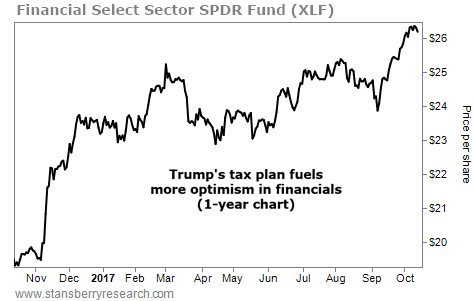| Home | About Us | Resources | Archive | Free Reports | Market Window |
|
Steve's note: I'm skeptical about investing in bitcoin. But I believe it's always valuable to learn something new. In today's essay, analyst Tama Churchouse clears up a few questions about the new world of cryptocurrencies. If you've been wondering how it all works, and what the real risks are, I hope you enjoy this piece...
Don't Let These Three Reasons Stop You From Buying BitcoinBy
Friday, October 13, 2017
Recently, after a long day of fly-fishing on the Yellowstone river in Montana, a group of us were talking about the day's fish count (specifically the lack thereof) when, at some point, the discussion turned to cryptocurrencies.
I was attending a small, offsite annual investment meeting run by a U.S.-based Asian equity fund manager. The handful of partners in the room, each unwinding with a cold beer, collectively held more than a century of fund-management expertise. When it comes to financial markets, and Asia in particular, these guys know their stuff.
But bitcoin? Not so much. The whole idea was still new to them. And I was the resident sounding board...
Below are the issues that most concerned my fishing partners about the world of cryptocurrencies. If you have doubts or questions about this new asset class, challenge yourself, and read on...
This was the first point of concern when it came to bitcoin. It's one that a lot of people have. And if you take a step back for a moment, it's utterly absurd.
For example, I've never once in my entire life ever heard anyone question the wisdom of investing in Alphabet (GOOGL), Facebook (FB), or any other technology company because of the risk of the "Internet going down."
Similarly, I know of nobody personally (in developed countries, at least) who insists that all his personal monetary wealth be kept in physical notes and coins in his possession rather than at a bank (where your savings represent little more than numbers on an electronic ledger) – all because he'd "lose it all" if the Internet went down.
And in the event that the entire global Internet communications system permanently collapsed (which is what would need to happen for bitcoin to become totally worthless), you'd have bigger concerns than the small allocation of cryptocurrencies in your portfolio.
In certain circles, bitcoin and cryptocurrencies are synonymous with hacking – thanks to some high-profile hacks of cryptocurrency exchanges. I point the finger at ignorant journalists who propagate their own poor understanding of cryptocurrencies to the broader public. Just to be clear, cryptocurrency exchanges have been hacked. They are third-party platforms where it's unclear how customers' digital assets are being secured. That's why I've said repeatedly that you shouldn't keep large amounts of bitcoin on an exchange... When it's on an exchange, you don't own it – the exchange does.
Instead of leaving yourself at the mercy of an incompetent third party, you can take full personal control and accountability for securing it yourself. The safest place to keep your bitcoin is in a digital wallet. You can set up one of these online... And it's one of the first steps to getting started with bitcoin.
Bitcoin is one of the most secure assets an individual can own. BUT it's 100% up to the individual to secure it!
China recently announced a ban on initial coin offerings (ICOs). These are when companies create and issue cryptocurrencies to the public in exchange for bitcoin or ethereum (the second-largest cryptocurrency). I wasn't surprised by the ban, given the sheer volume of ICOs taking place – especially those with seemingly little to no business viability. But China didn't "ban" bitcoin. And even if a government did want to ban it, the question is how? That cat's already out of the bag.
Bitcoin doesn't answer to any government. There is no bitcoin head office... no CEO... no board of directors.
What's more, major economies have no incentive to "ban" bitcoin. Any government that did would simply be saying, "We don't want innovation, technology jobs, new companies, or enterprise in general."
Now don't get me wrong – bitcoin is, and will be, regulated. (For example, don't think for a second that Uncle Sam is going to let you make 10 times your money on a cryptocurrency trade and not pay your "fair share" of taxes to the government's coffers.) But regulation isn't the same thing as an outright ban.
In conclusion... Bitcoin is a type of asset that's completely new to most people, so it's right to ask questions. That's a prudent approach when you're considering allocating capital to any venture, let alone one you're unfamiliar with. But don't let pre-existing biases get in your way.
When a new idea comes along, you don't have to accept it. But you can always choose to learn more.
Good investing,
Tama Churchouse
Further Reading:
"Plenty of critics say that bitcoin isn't real money. Why not?" Tama writes. Despite ongoing skepticism, he details why bitcoin is a form of money – and why mainstream acceptance is growing every day. Learn more here: Bitcoin Will Change How You Think About Money... Here's Why.
Today's essay isn't just about bitcoin... It's also about challenging your own biases as an investor. In this two-part series, Mike Barrett explains the attitudes that have made the great fundamental investors successful – including a willingness to update their beliefs. You can read it here and here.
Market NotesONE SECTOR IS EAGER FOR TRUMP'S TAX PLAN Today's chart highlights a sector that's hungry for policy changes...
We like to check in on America's big financial players from time to time. Firms like Wells Fargo (WFC), Bank of America (BAC), Berkshire Hathaway (BRK-B), Citigroup (C), and JPMorgan Chase (JPM) act as America's "financial backbone." They rise and fall with our country's ability to make money, service debts, and generally "just get along." And right now, financial stocks are on a tear...
The Financial Select Sector SPDR Fund (XLF) is heavily weighted toward America's banking juggernauts... The five firms we listed above make up a massive 44% of its holdings. Banks generally shoulder a large tax burden. But if President Donald Trump's new tax proposal succeeds, some estimates say that big banks could see their profits increase by as much as 20%.
As you can see in the chart below, financials soared after the presidential election stoked hopes for bank-friendly policies. The fund is up 34% in the past year... And shares climbed 7% this month alone. With Trump pushing for tax reform, this rally will likely continue...
 |
Recent Articles
|



